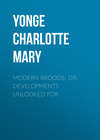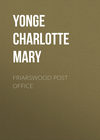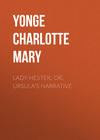Loe raamatut: «Nuttie's Father», lehekülg 13
CHAPTER XX
WOLF
'If I cannot once or twice in a quarter bear out a knave against
an honest man, I have but very little credit with your Worship.'—II. King Henry IV.
Another cause besides Ursula's recalcitrance and her mother's ailment contributed to disturb Mr. Egremont, and bring him home. His agent, by name Bulfinch, a solicitor at Redcastle, came to him with irrefragable proofs of gross peculation on the part of the bailiff who managed the home farm which supplied the house and stables, and showed him that it was necessary to make a thorough investigation and change of system.
In point of fact, Mr. Egremont greatly preferred being moderately cheated to exerting himself to investigate, but this was going beyond moderation, and the explosion had been too public to be passed over. So he came home and sat by, while his wife and Mr. Bulfinch did the work for him, and made it evident to him that the frauds had been of long standing, and carried on with the connivance of the coachman, of Gregorio,—who had before Mrs. Egremont's arrival acted as house steward,—and of the former cook. Indeed, it was the housekeeper whom Mrs. Egremont had left in charge, whose refusal to connive had brought about the discovery.
Gregorio's share in all was sufficiently evident, and Alice's heart leapt with hope. Her husband would be wholly her own if his evil genius were once departed, but Mr. Egremont would not see it. He had no objection to sacrifice the coachman and all his underlings, with the bailiff and his entire family, and felt none of the pity that Alice had for the pretty, silly, half-educated daughters; but as to the valet—Pooh! pooh! the poor fellow had been out of the way all this time—whatever he had done had been in the dark, ages long ago, before Bridgefield knew its mistress; he was a foreigner, and that was enough to prevent him from forgathering with the English. It was all their English prejudice.
'I can show you facts and figures, sir,' said Mr. Bulfinch.
'I daresay, a year or more old. Why, I was an unprotected carcase then—a mere prey—the fellow only did after his kind.'
Alice held her tongue then, but made an effort in private. 'Indeed, I don't think you know; I am afraid Gregorio is not altered. I found him out in his charges about the wine, and the servants' wages at Nice, only you wouldn't listen.'
'His little perquisites, my dear child! Come, nonsense, these foreign fellows don't pretend to have the morals you ascribe to the native flunkey—generally without foundation either—they are much of a muchness as to that; but your Frenchman or Italian does it more neatly, and is a dozen times better servant than the other is.'
'But—'
'Oh, ay! I know you don't like him. But he knows his manners to you, I hope?' said Mr. Egremont, with a suddenness that made her wish she could truthfully say he did not.
'Yes, he always is—is respectful, but somehow I see it is under protest.'
Mr. Egremont laughed. 'Rivals—yes, I see; why, you don't consider the sore trial of having a full-grown mistress turned in upon him! Look here, you keep the keys already, but the new fellow at the farm and all the rest of them shall account to you for everything—Gregorio and all. Won't that satisfy you?'
''Tis not only the money, but I think Gregorio is a bad—not a good—man.'
'Ho, ho! she wants to advertise for a pious footman and coachman! eh? No, I thank you, my dear Edda, I agree with—who was it who said, "Volez moi, mais sans m'ennuyer."'
The Rectory likewise had hoped for Gregorio's dismissal, and there were grave looks when Alice had to confess that nothing would move her husband against him. The Canon even lashed himself up to say, 'I tell you how it is, Alwyn, you'll never do any good with your household, while you keep that fellow.'
'I am not aware what description of good you expect me to do with it, Will,' coolly answered the elder brother in a disconcerting tone.
Poor Alice, on her side, thought of the Little Master, and then wondered if it was uncharitable to do so. For she knew it had become war to the knife with Gregorio! Whether his master told him, or whether it were his own evil conscience, or the wonderful intuition of servants, he certainly knew of the pressure for his dismissal, and he visited it on her as much as he durst.
Outwardly deferential, he could thwart and annoy her in a hundred ways, from making love to the housemaids to making evil suggestions to his master, yet never giving her any overt cause of complaint. He could worry and sting her under the politest exterior, and he knew very well that the most effectual form of annoyance was the persuading his master that any discomfort or lassitude was to be removed by some form of narcotic. This would have the further advantage of stupefying Mr. Egremont, and making him more ready to lapse under the old influence; while the duration and strength of the new one was already a surprise to Gregorio.
But there was no doubt that Mrs. Egremont had profited by her year of training. She looked tired, and less youthful and pretty, but she had gained in grace and importance as well as in style, and was much more really the mistress of Bridgefield. Her shyness had passed away, and she knew now to take her place in society, though still she was somewhat silent. And her husband depended upon her entirely for all his correspondence, for much of his occupation and amusement, and even for the regulation of his affairs. In the household, Gregorio was little more than his personal attendant, and she had the general management, even of the other men-servants. The Canoness might well say it had turned out better than she expected.
And Nuttie had become more womanly, and had acquired the indefinable polish given by a London season. She had learnt the art of conversation, and could make herself agreeable to her uncle, or to any one else who came in her way. Even May allowed that she had something in her, and cultivated her more than before; but, on the other hand, even the Rectory could perceive that there was now an absolute alienation between her and her father, and what might before have been fear had become dislike. If she had to refer to him, especially if her plans for herself or her mother were crossed, there was always a tone of bitterness or of sarcasm about her; and her greater boldness and freedom of speech would occasionally manifest itself towards him. This was not indeed often, since not only did his cool contempt make her come off the worst in the encounters, but the extreme distress they gave to her mother made her refrain whenever her temper, or what she thought her conscience, would let her; but still there was always a danger which kept poor Alice on thorns whenever there was a possible difference of schemes or opinions.
Mrs. William Egremont was seriously considering of representing to Ursula that her conduct was bad taste, bad policy, and, moreover, was doing her mother's spirits and health serious harm; but it was a delicate matter in which to meddle, and the good lady could not make up her mind how far to surrender her brother-in-law's character and allow a partial justification to Ursula. She was a cautious woman, and waited and watched her opportunities.
In the beginning of October Mr. and Mrs. Egremont were invited to a great shooting party at Sir James Jerningham's. The invitation did not include Ursula. Perhaps she had never dawned on their hostess's imagination; perhaps it was that Lady Jerningham was well known to dislike girls, or any one who might absorb young men's attention. At any rate the omission was a cause of thankfulness to the party concerned, and she did not neglect to worry her mother by a protest against keeping such company as would be met at Waldicotes.
Alice smiled a little faintly and said, 'I don't think it hurts me, my dear; I don't understand half of what they talk about, and they are always kind to me.'
'I don't think you ought to go among them or countenance them.'
'My dear child,'—and the colour rose—'I don't feel as if I had a right to set myself above any one.'
'Mother!'
'People might have said just the same of me.'
'And whose fault was that?' muttered Nuttie under her breath, but Mrs. Egremont would not hear. She only pleaded, as perhaps mother ought not to have done with child.
'You know, Nuttie, it is not for my own pleasure, but your father's eyesight makes him dislike to go anywhere without me now; and I really should be uneasy about him.'
'Yes; he is all you care for,' said Nuttie. 'You sacrifice everything you used to think essential, just to his will and pleasure.'
'Oh, Nuttie, I hope not; I don't think I do!'
'If I thought it was doing him any good I should not so much mind,' went on the girl; 'but he is just the same, and I am always thinking of "As the husband is, the wife is—"'
'Hush! hush! You have no right to think in that way of your father. I will not hear it. I have let you say too much already, Nuttie.' Then after a pause she added, gently and wistfully, 'You have been better taught, and are clearer headed than ever I was, my Nuttie, and it is quite right that you should hate what seems evil to you. I can only go on trying to do what seems my duty from day to day. I know,' she added with rising tears, 'that the sin and folly of my younger days worked a difficult position for us both; but we can only act according to our lights, and pray God to direct us; and please—please bear with me, my dear one, if the same course does not always seem right to us both.'
Nuttie had never heard her say anything so fully showing that she realised these difficulties, and, greatly touched, she asked pardon, kissed and caressed her mother. There was a calm over them for the next few days, and Nuttie actually refrained from bitter comments when her mother was not allowed to go to evensong on Sunday, on the plea of her being tired, but, as the girl believed, in order that she might read the newspapers aloud.
She knew that her silence was appreciated by the way her mother kissed her and called her a dear, good, considerate girl.
On Monday Mr. and Mrs. Egremont went away at what was a strangely early hour for the former, Nuttie spending her days at the Rectory.
On the Tuesday Blanche went with her little sister and the governess on a shopping expedition to Redcastle, and in relating her adventures on her return, she said, 'Oh, by the bye, I met Annaple in Park's shop!'
'Full of Micklethwayte news, I suppose,' said May.
'Yes, of course. Did you know, Nuttie, that your aunt was ill?'
'No, indeed, I did not. What was the matter?'
'Bronchitis, I believe—brown titus, as Betty Butter calls it.'
'Bronchitis! Oh dear! oh dear! Are you quite sure, Blanche?'
'Oh yes! I am quite certain Annaple said Mark told her that Miss Headworth was laid up with bronchitis.'
'And nobody has written to us all this week!' sighed Nuttie.
'I should think that a sign there could not be much in it,' observed May; 'it may be only a bad cold.'
'But Aunt Ursel had bronchitis four years ago, and was very ill indeed,' persisted Nuttie. 'I'm sure it is bronchitis, and that she won't let Miss Mary write to us.'
She was in much distress about it, though May privately told her that she ought to know Blanche's way better than to trust implicitly to any of her reports; and her aunt said much the same thing in more general terms, even proposing that if she did not hear the next morning she should go over to Lescombe to ascertain what Mark had really said.
This pacified her a little, but on her way home the alarm grew upon her, and, moreover, she recollected the opposition that she believed that her father was certain to make to either her mother or herself going to nurse her aunt. It flashed upon her that if she were to hasten to Micklethwayte on this alarm before there could be a prohibition, it would be no disobedience, and perfectly justifiable, not to say noble. Her parents were to return on Thursday evening, and she made up her mind that, unless she were fully reassured as to Miss Headworth's state, she would go off at once to Micklethwayte before any one could gainsay her. She had plenty of money, and she consulted the time-table in the hall before going upstairs. It only concerned the nearest line, but she calculated that if she caught the express, she should reach her destination in time to write to her mother at Waldicotes, and prevent needless shocks. Her eagerness for the plan grew upon her, so that it seemed like liberation; she could hardly sleep for thinking of it, and certainly was not as much disappointed as she believed herself when the post came in—a blank.
Martin was away with her mistress, so Nuttie explained matters to the upper housemaid, who was very sympathetic, carried down her orders for the carriage, procured for her both breakfast and provision for the journey, and packed her clothes. Ursula would fain have been off before the Rectory was aware, but the two little girls came up with a message about the plans for the day, just as she was beginning an explanatory note, and she entrusted to them the information that she was so uneasy about Miss Headworth that she had decided on going to see for herself.
So in dashed Adela and Rosalind to their mother's room full of excitement with the news that Cousin Nuttie was gone off by the train, because her aunt was very ill indeed.
'Gone, Adela? are you sure? Really gone?'
'Oh yes, mamma! The dogcart was coming round, and she said she wanted to catch the 10.05 train, and was very sorry she had not time to write a note to you.'
'Was there a letter? What had she heard?'
'Oh, only that her aunt was so very ill! She did not tell us—did she, Rosie?'
'There was something about being in time to write to Aunt Alice,' suggested Adela.
'I am very sorry about this. I am afraid it will be a great shock to Alice,' observed the mother, as she imparted the news at her husband's dressing-room door.
'Young girls are so precipitate!' said the Canon.
'Your brother won't like it at all,' the lady continued.
'Not he. But after all, it is just as well that he was not asked. They do owe that poor old lady a good deal, and Alwyn's not the man to see it. I'm not sorry the girl took the matter into her own hands, though I couldn't have advised it.'
'Except that it will all fall on Alice.'
'He is very fond of Alice. She has done more with him than I ever thought possible. Kept him respectable this whole year, and really it grows on him. He makes ever so much more of her now than when he first brought her home—and no wonder. No, no; he won't fall foul of her.'
'Perhaps not; but it is just as bad, or worse, for her if he falls foul of her daughter. Besides, she is very much attached to her aunt. I wish I knew what the account was, or whether she knows anything about it.'
CHAPTER XXI
URSULA'S RECEPTION
'Thy wish was father, Harry, to that thought.'—SHAKESPEARE.
It was at half-past seven o'clock that Ursula Egremont's cab stopped at St. Ambrose's Road. She had missed the express train, and had to come on by a stopping one. But here at last she was, with eyes even by gaslight full of loving recognition, a hand full of her cab-fare, a heart full of throbbing hope and fear, a voice full of anxiety, as she inquired of the astonished servant, 'Louisa, Louisa, how is Aunt Ursel!' and, without awaiting the reply, she opened the adjoining door. There sat, with their evening meal on the table, not only Mary Nugent, but Miss Headworth herself.
Nuttie rushed at her, and there was an incoherency of exclamations, the first thing that made itself clear to the senses of the traveller being, 'Ill, my dear? No such thing! Only I had a bad cold, and Mary here is only too careful of me.'
'But Mark said you had bronchitis.'
'What could have put that into his head? He did not write it, surely?'
'He wrote it to Annaple Ruthven, and she told Blanche.'
'Oh!' and Mary Nugent's tone was rather nettling.
'And then it was such a terrible time since we had heard anything,' added Nuttie, on the defensive.
'Did not your mother get my letter?' said Miss Headworth. 'I wrote to her at—what's the name of that place? I hope I addressed it right.'
'Oh, but I was not there. I didn't go with them.'
'Ah, yes, I remember. Then did not she send you?'
'No, I came off this morning. I heard this yesterday evening, and I determined that nothing should stop me if there was no news by the post.'
'Dear child! But will your father not be displeased?' said Miss Headworth.
'He hasn't any right to object,' cried Nuttie, with flashing eyes and a look that made Miss Nugent anxious; but at the moment there could be little thought save of welcome to the warm-hearted girl. Louisa was already brewing fresh tea, and extemporising additions to the meal, and Nuttie was explaining how she hoped to have arrived a couple of hours sooner.
'By the bye, I meant to have written to mother for her to have it to-morrow before leaving Waldicotes. Is there time?'
No, the pillar at hand was cleared at seven, and the regular post-office could not be reached in time; so they satisfied themselves with the knowledge that Mrs. Egremont must have had Aunt Ursel's cheerful letter, and Mary recommended telegraphing to the Canon the first thing in the morning. Then they gave themselves up to enjoyment.
'At any rate, I'm here,' said Nuttie, 'and I'll make the most of it.'
And her handsome furs were laid aside, and her boots taken off, and she resigned herself to absolute ease and luxury, while Mary poured out the tea, and her aunt heaped her plate with eggs and rashers 'such as one doesn't get anywhere else,' said Nuttie, declaring herself quite voracious, while her aunt fondly admired her growth and improvement, and she inquired into the cold, not quite gone yet; and there were speculations over what Mark could have got into his head. Mary remembered having met him coming to call, and having told him that she had persuaded Miss Headworth to keep her bed because her colds were apt to be severe, and it was agreed to lay the exaggeration at the door of the lovers and Blanche. Miss Headworth laughed, and said she ought to be flattered that an old woman's sore throat should be thought worthy of mention by a fine young gentleman like Mr. Mark. 'A very good young man he is,' she added. 'You would never have thought how kind he is in coming in here to tell me everything he hears about your dear mother, Nuttie.'
'He makes himself very useful while Mr. Dutton is away,' added Mary, 'taking his young men's class and all.'
'Oh! is Mr. Dutton away?'
'Yes; he has had to be in London a great deal of late. I am afraid he may have to live there altogether.'
'What a grievous pity!'
'He won't be anywhere without doing good,' said Miss Headworth, 'but I sometimes wish we had his cool good sense here.'
'And how is Mr. Spyers,' asked Nuttie. She felt shy of asking for Gerard Godfrey, or perhaps she thought she ought to be shy of his name, and kept hoping that it would come in naturally.
'Mr. Spyers is very well. Very busy of course, and very much delighted with your mother's gifts to the church. All her own work, isn't it, Nuttie?'
'Yes; every bit. She does lots of embroidery and work of all kinds when she is waiting for him or sitting with him, and luckily it has never occurred to him to ask what it is for.'
The two ladies knew well what was meant by him, but they would not pursue the subject, and proceeded to put Nuttie au courant with St. Ambrose affairs—how last year's mission had produced apparently an immense effect in the town, and how the improvement had been ebbing ever since, but had left various individual gains, and stirred up more than one good person who had hitherto thought it enough to save one's own soul and let other people alone; how Mr. Spyers was endeavouring to bind people together in a guild; how a violent gust of temperance orators had come down upon the place, and altogether fascinated and carried away Gerard Godfrey.
There was his name at last, and Nuttie was rather gratified to feel herself blushing as she asked, 'Ah! poor Gerard—how is he?'
'As good and sincere as ever,' said Miss Nugent, 'but not much wiser. He is so excitable and vehement.'
'Yes,' said Miss Headworth. 'I don't understand the kind of thing. In my time a steady young clerk used to be contented after hours with playing at cricket in the summer, or learning the flute in the winter—and a great nuisance it was sometimes, but now Gerard must get himself made a sort of half clergyman.'
'A reader,' suggested Mary.
'Minor orders. Oh, how delightful!' cried Nuttie.
'People, don't half understand it,' added Miss Headworth. 'Mrs. Jeffreys will have it that he is no better than a Jesuit, and really I did not know what to say, for he talked, to me by the hour about his being an external brother to something.'
'Not to the Jesuits, certainly,' said Nuttie.
'Yes, I told her that; but she thinks all monks are Jesuits, you know, and that all brothers are monks; and he does wear his cassock—his choir cassock, I mean—when he has his service in the iron room at the sandpits. And now he has taken up temperance, and flies about giving the pledge, and wanting one to wear bits of blue ribbon. I told him I never did take, and never had taken, more than a little hot wine and water when I had a cold, and I couldn't see what good it would do to George Jenkins and the poor fellows at the Spread Eagle if I took ever so many vows.'
'There's a regular blue-ribbon fever set in,' said Miss Nugent. 'Gerard told me I was supporting the cause of intemperance yesterday because I was so wicked as to carry the rest of your bottle of port, Miss Headworth, to poor Anne Crake.'
'Well! he is a dear boy, and youth wouldn't be youth if it were not sometimes rather foolish,' said Miss Headworth, 'and it is better it should be for good than evil.'
'Eager in a cause and not for selfishness,' said Mary. 'Poor Gerard, I wonder where he will be safely landed!'
So did Nuttie, who had a secret flattering faith in being the cause of all the poor young fellow's aberrations, and was conscious of having begun the second volume of her life's novel. She went to bed in the elated frame of mind proper to a heroine. There was a shade over all in the absence of dear old Mrs. Nugent, and in Mary's deep mourning, but there is more tenderness than poignancy in sorrow for shocks of corn gathered in full season, and all was cheerful about her.
She had quite a triumph the next day, as old friends dropped in for the chance of seeing her. The least agreeable encounter was that with Mark, who came in on his way to the office, having just received by the second post a letter from his father inquiring into Miss Headworth's state. He met Nuttie in the vestibule, with her hat on, and in a great hurry, as she wanted to walk with Mary to the School of Art, Gerard Godfrey accompanying them as far as the office; and she did not at all like the being called to account, and asked what could have possessed her to take alarm.
'Why, you wrote yourself!'
'I!'
'To Annaple Ruthven.'
'What am I supposed to have written?'
'That Aunt Ursel was very ill with bronchitis.'
'I'll be bound that Miss Ruthven said no such thing. You don't pretend that you heard it from herself?'
'No; but Blanche did.'
'Blanche! Oh, that accounts for it! Though I should have thought you knew Blanche by this time.'
'But what did you say?'
'I believe I said I couldn't get a knitting pattern Miss Headworth was to send Lady Ronnisglen because she was in bed with a cold. What you and Blanche could contrive to make of a simple thing like that—'
'And Annaple!'
'Well,' but checking himself with a smile, 'we will not fight about that. I only hope it has not brought you into an awkward scrape, Nuttie.'
'I can't help that,' she answered with her head rather high.
'You have written and explained?' he said anxiously.
'To my mother, of course.'
'If I were you,' he said, lowering his voice, 'I should write or send a special message to your father.'
'I can't see why. It was a mistake.'
'Yours was a strong measure, and he won't like it. Be advised, Nuttie. Recollect your mother. The best way would be to go home at once. I could get a day to take you—if you would start this afternoon.'
'Thank you; I'm not going back till I hear,' she said proudly.
Time being up, Mark took his leave hastily, and as he shut the door, Nuttie uttered half aloud the words she had scarcely repressed, 'No, I thank you, Mr. Mark, I am not going back like a dog in a string.'
'What, was that what he expected of you?' said Gerard Godfrey, whom she had not intended to hear her, but who had come out of the sitting-room on the sounds of departure.
'He said he would take me home if I could go at once.'
'Wouldn't he have liked it!' exclaimed Gerard.
'It might be the best way,' said Miss Nugent, who had followed young Godfrey.
'Now, Miss Mary,' cried Nuttie, 'as if I could shorten my holiday now that I have it.'
'And I don't see what business he had to call you to account,' said Gerard. 'A stuck-up fellow.'
'Of course all the Egremonts are set against my being here,' said Nuttie.
'I thought the Canon offered to bring you last year,' said Mary gently.
'Oh, that was only to Monks Horton! It would have been simply tantalising.'
'Lady Kirkaldy is an excellent person,' said Miss Nugent.
'Is she at home now?' asked Ursula.
'Coming next week, they tell me,' said Gerard.
'He—your cousin—will always be loafing up there now, giving up all that he had undertaken, I suppose.'
'Not very likely,' said Mary quietly.
It is a mere Scottish anti-church influence,' said Gerard, turning round at the swing-door of his office. 'Why else will Egremont not take the pledge?'
Wherewith he disappeared, blue ribbon and all, while Mary smiled, though she was vexed; and Nuttie observed, 'Poor Gerard; but I can't see why he should be jealous of Mark now.'
Mary did not choose to understand what Nuttie implied in her simplicity, and made answer, 'He is rather blue ribbon mad. Besides, I am afraid the fact of being a "swell" does not conduce to your cousin's popularity among the clerks.'
'Surely he does not give himself airs,' said Ursula, her family feelings awaking.
'No; but I fancy he is rather reserved.'
'What's this about giving up what he has undertaken? What is it?'
'When Mr. Dutton went to London, he asked Mark to take his Sunday afternoons with the big lads. He thought they wanted some one with more resources and variety than there is in poor Gerard, who didn't at all like being passed over.'
'I never should have thought it of Mark. He never dreamt of teaching anybody at home.'
'Very likely not, but there is an atmosphere at St. Ambrose's.'
'And oh, how glad I am to be in it! I wonder how long they will let me stay! The dear little mother will try to get me a Sunday here, if she dares. Indeed, I can't hear before Saturday, and then there would hardly be time to get home! Oh, that's jolly! I'll go to the nursery gardens, and get such flowers for the vases!'
Saturday brought Nuttie a letter, but not from her mother—
'My Dear Ursula—I write because we are anxious to keep your mother as quiet as possible. It was a serious shock to her to find that you had left home, and she naturally supposed that Miss Headworth was in great danger. Your father was greatly displeased, and she has been much overcome, and very unwell, but we hope by keeping her perfectly quiet that worse consequences may be prevented. Your father desires you to remain where you are for the present, as he will not have her disturbed again. Your mother sends her love both to you and to your aunt, and desires me to say that she will write in a day or two, and that she thinks you had better not come back till she is better and your father's vexation has diminished.
'I wish you had informed us of your intentions, as then we could have ascertained the grounds of the report that terrified you so strangely.—I remain your affectionate aunt,
JANE M. EGREMONT.'
'Poor mother! he has been sneering at us all in his dreadful cynical way, and knocked her up into one of her awful headaches,' said Nuttie, who felt extremely angered by the grave tone of rebuke in the letter, and tossed it over to her aunt without absolutely reading it all. Miss Headworth was a good deal distressed, and anxious to know what Mrs. William Egremont meant; but Nuttie positively declared, 'Oh, it is her headaches! You know she always had them more or less, and they have grown a great deal worse since she has taken to sitting in that horrid, stuffy, perfumy, cigar-ry room, and doesn't take half exercise enough.'
And when Miss Headworth showed herself much concerned about the state of things, Nuttie coaxed her, and declared that she should fancy herself unwelcome, and have to go and beg a lodging somewhere instead of enjoying her reprieve. And Aunt Ursel was far less impervious to coaxing than she used to be when she was the responsible head of a boarding house. She did most thoroughly enjoy the affection of her great niece, and could not persuade herself to be angry with her, especially when the girl looked up smiling and said, 'If the worst came to the worst and he did disinherit me, the thing would only right itself. I always meant to give it back to Mark.'
No great aunt in the world could fail to admire the generous spirit of the girl who came back from the great world of luxury, so loving and happy in her humble surroundings. The only sighs were for poor Alice, in the hands of a man of whom Miss Headworth knew so much evil. If she were not wretched and a victim—and Nuttie did not think her such—she must surely be getting spoilt and worldly. Her daughter implied fears of this kind, yet who could read her letters and think so?
Nuttie was fortunately too much in awe of the Canoness to write all the pertnesses that tingled at her fingers' ends, and she sent a proper and fairly meek letter, intimating, however, that she was only too happy to remain at Micklethwayte.



















